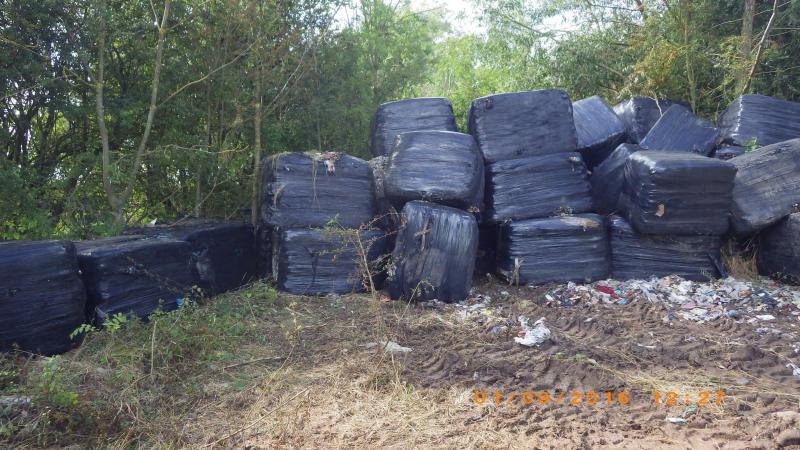
The Environment Agency has issued a warning after a reported rise in the dumping of baled waste on land.
The National Farmers' Union (NFU) has said that organised gangs are either targeting empty land or offering farmers money to store waste on land or inside property, promising to come back and remove it.
In past cases, farmers have been offered between £600 and £1,200 for 3 months' storage, only for the waste to be left on the property.
The NFU said bales are liable to contaminate land and could cost thousands of pounds to remove legally.
Often the waste is mixed municipal waste, badged under the term of RDF (Refuse Derived Fuel).
Under the law, it is a landowner’s duty of care to understand the waste coming onto the land. An offence may be committed by allowing waste to be stored on land without the relevant permissions.
An environmental permit or waste exemption is needed to store or use waste material.
'Vulnerable'
Jamie Fletcher, North East area environment manager for the Environment Agency, said farmers are vulnerable to criminals looking to illegally dump waste in fields or empty warehouses.
“There are steps they can take to better protect themselves, such as securing sites and buildings and checking them regularly, carrying out rigorous checks on prospective tenants looking to rent their property, and making sure they are aware of their duty of care responsibilities,” Mr Fletcher said.
“We work closely with partners to share intelligence, track and prosecute organised crime gangs involved in illegal waste activity. But we can’t do it alone.
“We encourage everyone to do their bit: for property and land owners to be vigilant and better protect themselves and for all businesses, organisations and individuals to manage their waste responsibly, preventing it from getting into criminal hands in the first place.”
Significant issue
A recent survey revealed that almost two thirds of farmers and landowners have been affected by fly-tipping and over half agree it is a significant issue in their area.
Because of the survey's results, rural organisation the CLA has launched a five-point action plan that it believes should be adopted to "tackle the scourge of fly-tipping blighting the countryside".
The CLA also recommends enforcing fines for home and business owners whose waste is found in fly-tipped locations and appointing a ‘Fly-Tipping Tsar’ to co-ordinate with national agencies on the scale of this organised crime.
The plan also proposes developing new ways to clear up and support victims so that private landowners and farmers are not liable.
